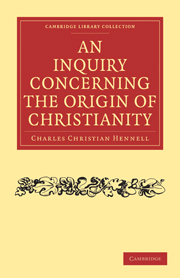Book contents
- Frontmatter
- PREFACE
- Contents
- ERRATA
- CHAPTER I Historical sketch, from the Babylonish captivity to the death of Jesus
- CHAPTER II Historical sketch, continued to the end of the first century
- CHAPTER III On the date and credibility of the Gospel of Matthew
- CHAPTER IV On the date and credibility of the Gospel of Mark
- CHAPTER V On the date and credibility of the Gospel of Luke
- CHAPTER VI On the date and credibility of the Gospel of John
- CHAPTER VII Examination of the accounts of the Resurrection and Ascension
- CHAPTER VIII Remarks on the other miracles in the four Gospels
- CHAPTER IX General objections to the miracles of Jesus
- CHAPTER X Remarks on the miracles in the Acts of the Apostles
- CHAPTER XI On the evidence afforded to the miracles by the apostolic writings
- CHAPTER XII On the prophecies
- CHAPTER XIII On the parts of Isaiah supposed to relate to Christ
- CHAPTER XIV On the book of Daniel
- CHAPTER XV Whether Jesus foretold his own death and resurrection
- CHAPTER XVI On the character, views, and doctrine of Jesus
- CHAPTER XVII Comparison of the precepts of Jesus with the Jewish writings
- CHAPTER XVIII Concluding reflections
- APPENDIX
CHAPTER IX - General objections to the miracles of Jesus
Published online by Cambridge University Press: 05 March 2012
- Frontmatter
- PREFACE
- Contents
- ERRATA
- CHAPTER I Historical sketch, from the Babylonish captivity to the death of Jesus
- CHAPTER II Historical sketch, continued to the end of the first century
- CHAPTER III On the date and credibility of the Gospel of Matthew
- CHAPTER IV On the date and credibility of the Gospel of Mark
- CHAPTER V On the date and credibility of the Gospel of Luke
- CHAPTER VI On the date and credibility of the Gospel of John
- CHAPTER VII Examination of the accounts of the Resurrection and Ascension
- CHAPTER VIII Remarks on the other miracles in the four Gospels
- CHAPTER IX General objections to the miracles of Jesus
- CHAPTER X Remarks on the miracles in the Acts of the Apostles
- CHAPTER XI On the evidence afforded to the miracles by the apostolic writings
- CHAPTER XII On the prophecies
- CHAPTER XIII On the parts of Isaiah supposed to relate to Christ
- CHAPTER XIV On the book of Daniel
- CHAPTER XV Whether Jesus foretold his own death and resurrection
- CHAPTER XVI On the character, views, and doctrine of Jesus
- CHAPTER XVII Comparison of the precepts of Jesus with the Jewish writings
- CHAPTER XVIII Concluding reflections
- APPENDIX
Summary
I. He himself put his miracles of healing upon a level with the performances of the Jewish physicians. Matt, xii. 27, “And if I by Beelzebub cast out devils, by whom do your children cast them out? therefore they shall be your judges.” If his cures could not more fairly be attributed to Beelzebub than those of the Jewish doctors, neither could they more properly be considered miracles. But it is only in the present age that such an inference excludes the miracle, because in Christ's own time the arts of healing and magic were supposed to be closely related, and Josephus speaks several times of the casting out of demons as performed by miraculous means.
II. He recognized the attempts of others as real miracles, and made no distinction between them and his own. Mark ix. 38, 39, “And John answered him, saying, Master, we saw one casting out devils in thy name, and he followeth not us; and we forbad him, because he followeth not us. But Jesus said, Forbid him not; for there is no man which shall do a miracle in my name that can lightly speak evil of me.” There have been many instances, in all ages of the church, of persons pretending to exorcise by merely using the name of some eminent saint or prophet; but no satisfactory proof of any thing miraculous is to be found in such stories, and in general they are considered undeserving of serious attention. Yet the performances of the pretender mentioned by Mark are no more questioned on the score of genuineness than those of Christ himself.
- Type
- Chapter
- Information
- An Inquiry Concerning the Origin of Christianity , pp. 185 - 193Publisher: Cambridge University PressPrint publication year: 2010First published in: 1838



